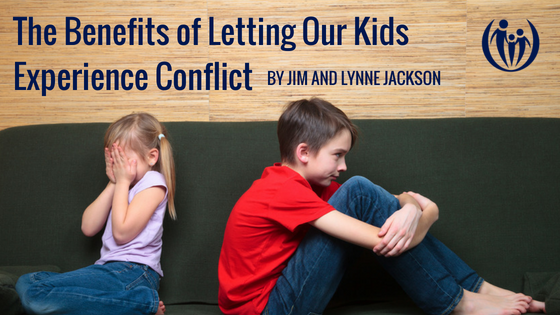
The Benefits of Letting Our Kids Experience Conflict

Sometimes it can be a good thing to let kids fight. This played itself out last week as I was caring for my niece and nephews (4th – 7th grade). During dinner they began to argue the sort of argument that I wanted to immediately stop. I felt my anxious chemicals kick in, but I took a deep breath instead of saying something. I just waited. (BTW – learning to recognize our own physical symptoms of stress is a really important parenting skill).
The kids didn’t fight well and it ended badly, the youngest one running away in tears because the older ones had ganged up on her. Some parents would say I should have immediately stopped the disrespect and required more honoring behavior. Maybe. I am crafty enough in working with youngsters that I could have intervened and gotten them back on track. But then their resolution would have happened because of my management skills, not their own resolve. What happened next is why I like to wait unless people are being downright abusive. I like to simply make observations and ask questions about what happened in order to help the kids understand themselves better.
The room was quiet as the older two resumed their eating. When they were about done and getting ready to leave the table I queried, “You guys are pretty quiet. Is this how it usually goes when you argue?”
“Yes,” the middle child replied. “She always cries and then gets her way.”
“Why do you suppose she cries?”
“Because she’s so touchy,” said one. “We were right and she didn’t like it.” said the other.
“I can see that the point you guys were making in that argument was right. You have a good sense of fairness.” I wanted to validate whatever there was to validate. This is a tough skill to develop, but it almost always takes the wind out of the sails of kids’ negative energy if I can offer some sincere, positive input. Then I asked, “What was good about how you argued?”
The boys were silent. One dropped his head. The other said, “We were kinda mean.”
“And you like that?” I calmly asked.
“No.” They both shook their heads.
Now I was at a little crossroads. I asked the question not to expose their guilt, but to find more ways to validate first. We tend as parents to think that when kids do bad things that it’s all bad, and we give all our energy to the badness, but in almost every misbehavior is a strange mix of good and of bad. If we can validate the good as part of the plan to address the bad, it almost always settles kids down and helps them feel supported in the discipline, not attacked and defensive. Since they went right to the bad, I had the choice of either asking more questions to help them get at it, or to simply say what I saw, maybe even put some words in their mouth that they weren’t able to say. I chose the latter.
“So, I think I get that you guys feel frustrated when your sister complains in an argument and runs away before you feel like she understood you.” Now they were nodding. (I almost always prefer nods to shakes of the head.) So I continued. “I bet you feel angry that baby sister gets to behave like this but you feel like you don’t. It’s a good thing to feel frustrated when you feel treated unfairly. And it’s good that you value fairness.” More nodding. When people feel validated they are usually more receptive to criticism.
“So what wasn’t good about how you argued? You already said you were kinda mean. What else?”
“We were loud,” said one. “It was two against one,” said the other.
“So you were loud and mean and you ganged up on her. How do you think it felt to be her?” Here’s where I was hoping they’d start to feel some empathy for what it feels like to be ganged up on by two loud and dominant older brothers. When they both shrugged I raised my voice a bit and said. “Well, do you guys like being ganged up on? How would it feel to you to have older and bigger people yelling at you, even if they are right?”
Neither boy spoke. Then the oldest got up and started to empty the trash bag they had argued was her job. I told him that was unnecessary. Just then the little sister came down the stairs with a big smile. “What are you smiling about?” I asked.
“They were right, I should empty the trash.” It seems the few minutes of quiet in her room helped her think more clearly and realize her brothers were indeed right. As she entered the kitchen the youngest brother said, “Sorry for yelling at you.” The older brother came over to her, also apologized, and gave her a little hug. She emptied the trash and they went on to have a nice evening hanging out together. I knew I could also spend some time with the sister, helping her think through her responses too, but that would have to wait for another time. We had board games to play!
As you can see, this was all much more complicated for me than just interrupting their argument and requiring respect. But I hope you can see the value of wading into the complexities with the goal of engaging the kids in thinking this all through for themselves.
What do you think? Is this approach worth the effort? Or do you think the immediate approach is best?

